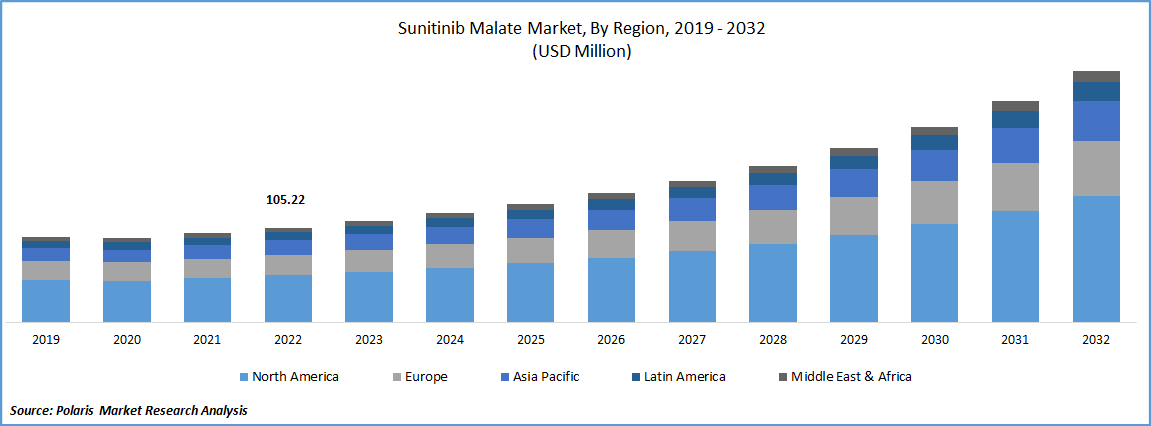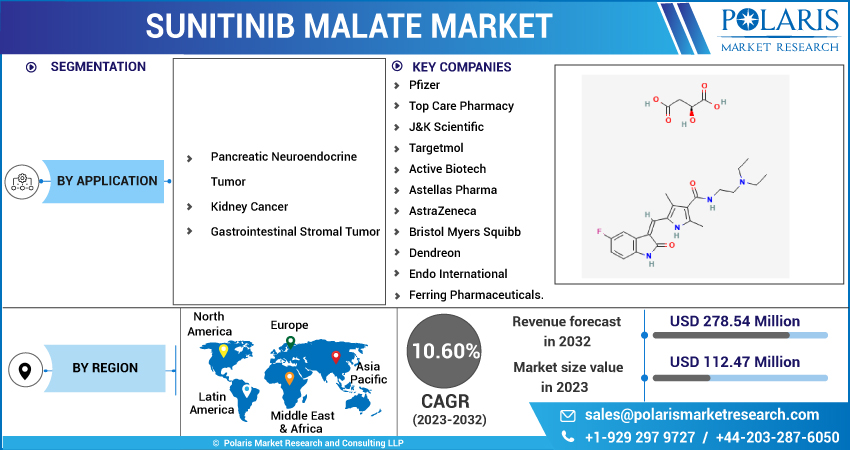
Sunitinib Malate Market Share, Size, Trends, Industry Analysis Report, By Application (Pancreatic Neuroendocrine Tumor, Kidney Cancer, Gastro-intestinal Stromal Tumor); By Region; Segment Forecast, 2023-2032
- Published Date:Jun-2023
- Pages: 115
- Format: PDF
- Report ID: PM3356
- Base Year: 2022
- Historical Data: 2019-2021
Report Outlook
The global sunitinib malate market was valued at USD 105.22 Million in 2022 and is expected to grow at a CAGR of 10.60% during the forecast period. As the incidence of cancer increases, there is a growing demand for effective cancer treatments such as sunitinib Malate. Sunitinib Malate is a targeted therapy that inhibits the activity of specific proteins that promote cancer cell growth and proliferation. It is an important treatment option for patients with advanced or metastatic renal cell carcinoma or gastrointestinal stromal tumors, where it has been shown to improve progression-free survival and overall survival. According to Word Health Organization (WHO), In low- and lower-middle-income nations, cancer-causing infections including the human papillomavirus (HPV) and hepatitis are thought to be the cause of 30% of cancer cases. Almost 10 million deaths worldwide, or nearly one in every six, will be due to cancer in 2020.

To Understand More About this Research: Request a Free Sample Report
Sunitinib malate is a type of targeted therapy drug used in cancer treatment. It functions by preventing the development and division of cancer cells within the body. In recent years, there have been significant advancements in cancer treatment, and sunitinib malate has played a key role in this progress. Sunitinib malate is often used in combination with other cancer treatments, such as chemotherapy and radiation therapy, to improve treatment outcomes. This has led to increased demand for sunitinib malate in cancer treatment.
Precision oncology, artificial intelligence, DNA sequencing, and other technologies are being used by scientists to advance illness treatment and detection. The DNA of more than 12,000 cancer tumors has been sequenced, and a new test has been developed to detect pancreatic cancer, one of the deadliest malignancies. The use of DNA sequencing and other advanced technologies in medicine has fueled the growth of the sunitinib malate market by increasing the effectiveness and demand for targeted cancer therapies. As new technologies and treatment approaches continue to emerge, it is likely that the market for sunitinib malate and other targeted cancer therapies will continue to grow in the coming years.
With an increase in government expenditure, there has been a significant investment in healthcare infrastructure, including the development of new hospitals and healthcare centers. This has led to better access to healthcare services, including cancer treatment, which has increased the demand for effective cancer treatments like sunitinib malate. According to the Economic Report 2022–23, the budgeted healthcare spending for the federal and state governments reached 2.1% of GDP in FY23 and 2.2% in FY22, compared to 1.6% in FY21. This will fuel the growth of the sunitinib malate market by investing funds on research and development.
The Indian government has introduced various initiatives to improve access to cancer treatment, including making cancer drugs more affordable and accessible. This has made it easier for patients to access expensive cancer treatments like sunitinib malate. For instance, to encourage the use of digital technology and tools to enhance cancer care throughout India, the National Cancer Grid (NCG) developed the Koita Centre for Digital Oncology (KCDO).

For Specific Research Requirements, Speak With the Research Analyst
Industry Dynamics
Growth Drivers
The growing prevalence of various types of cancers, including kidney cancer, gastrointestinal stromal tumors (GIST), and pancreatic neuroendocrine tumors (PNET), is expected to drive the demand for sunitinib malate. Sunitinib malate is a targeted therapy used in the treatment of cancer, which offers benefits such as reduced toxicity and improved outcomes compared to traditional chemotherapy. The growing adoption of targeted therapies in cancer treatment is expected to drive the demand for sunitinib malate.
Personalized cancer treatments are tailored to individual patients based on their specific genetic and molecular characteristics. Sunitinib malate is often used in combination with other targeted therapies to create personalized treatment plans for cancer patients, which is expected to drive the demand for the drug. The development of novel drug delivery systems, such as nanotechnology-based drug delivery systems, is expected to improve the efficacy and safety of cancer treatments. This is expected to drive the demand for sunitinib malate, which is often used in combination with such drug delivery systems.
Report Segmentation
The market is primarily segmented based on application and region.
|
By Application |
By Region |
|
|
To Understand the Scope of this Report: Speak to Analyst
Pancreatic Neuroendocrine Tumor segment is expected to witness fastest growth during forecast period
Pancreatic Neuroendocrine Tumor (PNET) segment is expected to experience faster growth in the study period. It is an uncommon type of pancreatic cancer that develops from the endocrine cells of the pancreas. Sunitinib malate is an oral, multi-targeted tyrosine kinase inhibitor used in the treatment of several types of cancer. It is a challenging cancer to treat and is often resistant to conventional chemotherapy. Sunitinib malate has been approved by regulatory agencies such as the U.S. Food and Drug Administration (FDA) for the treatment of unresectable or metastatic PNET.
The increasing incidence of PNET has fueled the demand for sunitinib malate, driving the growth of the market. Additionally, the increasing awareness of the benefits of sunitinib malate in the treatment of PNET has led to increased adoption of the drug by healthcare providers. Moreover, ongoing research and development activities aimed at exploring new applications for sunitinib malate, as well as improving the efficacy and safety of the drug, are expected to further fuel the growth of the market in the upcoming years.
North America is expected to hold higher growth and the larger revenue share in 2022
North America is expected to have both a higher growth rate and a larger revenue share for the sunitinib malate market. This region has a well-established healthcare infrastructure, favorable government policies, and a high prevalence of cancer, which are all contributing factors to the growth of the market. According to the American Cancer Society, In the United States, it is anticipated that there will be 1,918,030 new cancer cases and 609,360 cancer deaths in 2022, with lung cancer accounting for about 350 of those fatalities daily and being the primary cause of cancer mortality. Additionally, the growing adoption of advanced cancer treatments and increasing demand for personalized cancer therapies are also expected to further drive the growth of the sunitinib malate market in North America.
Competitive Insight
Some of the major players operating in the global market include Pfizer, Top Care Pharmacy, J&K Scientific, Targetmol, Active Biotech, Astellas Pharma, AstraZeneca, Bristol Myers Squibb, Dendreon, Endo International & Ferring Pharmaceuticals.
Recent Developments
- In September 2022, CytoReason introduced multi-year collaboration with the Pfizer to leverage CytoReason's AI technology for the Pfizer's drug related activities.
- In January 2023, CinCor Pharma, acquired by the AstraZeneca. CinCor specializes in the development of innovative therapies for resistant & un-controlled hypertension coupled with the chronic kidney disease.
Sunitinib Malate Market Report Scope
|
Report Attributes |
Details |
|
Market size value in 2023 |
USD 112.47 Million |
|
Revenue forecast in 2032 |
USD 278.54 Million |
|
CAGR |
10.60% from 2023 - 2032 |
|
Base year |
2022 |
|
Historical data |
2019 - 2021 |
|
Forecast period |
2023 - 2032 |
|
Quantitative units |
Revenue in USD million and CAGR from 2023 to 2032 |
|
Segments covered |
By Application, By Region |
|
Regional scope |
North America, Europe, Asia Pacific, Latin America; Middle East & Africa |
|
Key companies |
Pfizer, Top Care Pharmacy, J&K Scientific, Targetmol, Active Biotech, Astellas Pharma, AstraZeneca, Bristol Myers Squibb, Dendreon, Endo International & Ferring Pharmaceuticals. |
FAQ's
The global sunitinib malate market size is expected to reach USD 278.54 Million by 2032.
Key players in the sunitinib malate market are Pfizer, Top Care Pharmacy, J&K Scientific, Targetmol, Active Biotech, Astellas Pharma, AstraZeneca, Bristol Myers Squibb.
North America contribute notably towards the global sunitinib malate market.
The global sunitinib malate market expected to grow at a CAGR of 10.60% during the forecast period.
The sunitinib malate market report covering key segments are application and region.
